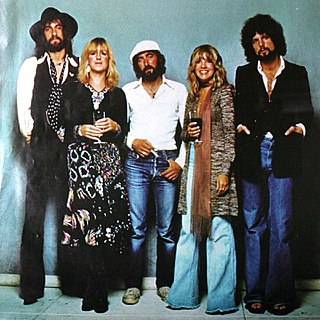
Fleetwood Mac are a British-American rock band, formed in London in 1967. Fleetwood Mac were founded by guitarist Peter Green, drummer Mick Fleetwood and guitarist Jeremy Spencer, before bassist John McVie joined the line-up for their self-titled debut album. Danny Kirwan joined as a third guitarist in 1968. Keyboardist and vocalist Christine Perfect, who contributed as a session musician from the second album, married McVie and joined in 1970.

Michael John Kells Fleetwood is a British musician, songwriter and occasional actor. He is best known as the drummer, co-founder, and leader of the rock band Fleetwood Mac. Fleetwood, whose surname was merged with that of the group's bassist John "Mac" McVie to form the name of the band, was inducted into the Rock and Roll Hall of Fame with Fleetwood Mac in 1998.
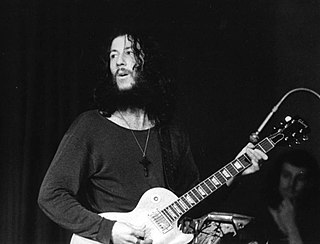
Peter Allen Greenbaum, known professionally as Peter Green, was an English blues rock singer-songwriter and guitarist. As the founder of Fleetwood Mac, he was inducted into the Rock and Roll Hall of Fame in 1998. Green founded Fleetwood Mac in 1967 after a stint in John Mayall's Bluesbreakers and quickly established the new band as a popular live act in addition to a successful recording act, before departing in 1970. Green's songs, such as "Albatross", "Black Magic Woman", "Oh Well", "The Green Manalishi " and "Man of the World", appeared on singles charts, and several have been adapted by a variety of musicians.

Fleetwood Mac, also known as Peter Green's Fleetwood Mac, is the debut studio album by British blues rock band Fleetwood Mac, released on 24 February 1968. The album is a mixture of blues covers and originals penned by guitarists Peter Green and Jeremy Spencer, who also share the vocal duties. It is the only album by the band without any involvement of keyboardist/vocalist Christine McVie.

Mr. Wonderful is the second studio album by British blues rock band Fleetwood Mac, released on 23 August 1968. This all-blues album was broadly similar to their debut album, albeit with some changes to personnel and recording method. The album was recorded live in the studio with miked amplifiers and PA system, rather than plugged into the board. A horn section was introduced and Christine Perfect of Chicken Shack was featured on keyboards. In the US, the album was not issued under the name Mr. Wonderful, though around half of the tracks appeared on English Rose.
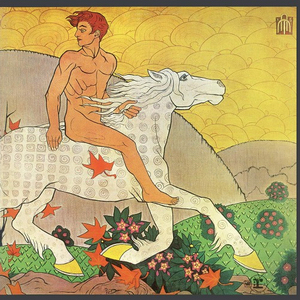
Then Play On is the third studio album by the British blues rock band Fleetwood Mac, released on 19 September 1969. It was the first of their original albums to feature Danny Kirwan and the last with Peter Green. Jeremy Spencer did not feature on the album apart from "a couple of piano things". The album offered a broader stylistic range than the straightforward electric blues of the group's first two albums, displaying elements of folk rock, hard rock, art rock and psychedelia. The album reached No. 6 on the UK Albums Chart, becoming the band's fourth Top 20 LP in a row, as well as their third album to reach the Top 10. The album's title, Then Play On, is taken from the opening line of William Shakespeare's play Twelfth Night — "If music be the food of love, play on".
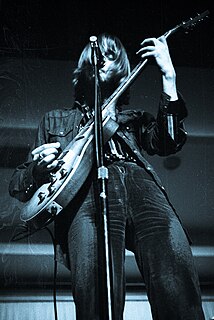
Daniel David Kirwan was a British musician whose greatest success came with his role as guitarist, singer and songwriter with the blues rock band Fleetwood Mac between 1968 and 1972. He released three albums as a solo artist from 1975 to 1979, recorded albums with Otis Spann, Chris Youlden, and Tramp, and worked with his former Fleetwood Mac colleagues Jeremy Spencer and Christine McVie on some of their solo projects. As a member of Fleetwood Mac, he was inducted into the Rock and Roll Hall of Fame in 1998.

Future Games is the fifth studio album by British-American rock band Fleetwood Mac, released on 3 September 1971. It was recorded in the summer of 1971 at Advision Studios in London and was the first album to feature Christine McVie as a full member. This album was also the first of five albums to feature American guitarist Bob Welch. “He was totally different background – R&B, sort of jazzy. He brought his personality,” Mick Fleetwood said of Welch in a 1995 BBC interview. “He was a member of Fleetwood Mac before we'd even played a note.”

Kiln House is the fourth studio album by British blues rock band Fleetwood Mac, released on 18 September 1970 by Reprise Records. This is the first album after the departure of founder Peter Green, and their last album to feature guitarist Jeremy Spencer. Christine McVie was present at the recording sessions and contributed backing vocals, keyboards and cover art, although she was not a full member of the band until shortly after the album's completion.

Live in Boston is a live album by British blues-rock band Fleetwood Mac that was first released in 1985.

Show-Biz Blues: Fleetwood Mac 1968 to 1970 is an album by British blues rock band Fleetwood Mac, released in 2001. It was a compilation of outtakes and unreleased tracks from the band's early line-up, none of which had previously seen the light of day officially. Available on double vinyl LP and double CD, it came with a booklet of extensive notes and anecdotes, and was the companion release to The Vaudeville Years of Fleetwood Mac 1968-1970.

Flee is an album by British blues rock musician Jeremy Spencer credited as "The Jeremy Spencer Band", with particularly strong input from Michael Fogarty. Spencer had been a member of Fleetwood Mac from 1967–71, and this 1979 release was Spencer's third album apart from Fleetwood Mac, and his second recorded while a member of the Children of God.

Blues Jam in Chicago is a recording by the British rock band Fleetwood Mac, originally released in two single-LP volumes by Blue Horizon in December 1969. It was the result of a recording session in early 1969 at Chess Records in Chicago with Fleetwood Mac, then a young British blues band, and a number of famous Chicago blues artists from whom they drew inspiration. The album has also been released, with slightly different track listings, under the titles Blues Jam at Chess Volumes One and Two and Fleetwood Mac in Chicago, the latter by Sire Records in 1976.

Jeremy Spencer is an album by British blues rock musician Jeremy Spencer, who was a member of Fleetwood Mac from 1967–71. Released on 23 January 1970, this was his first solo album and the first solo album by a current member of Fleetwood Mac.
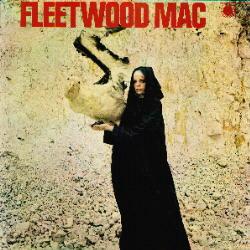
The Pious Bird of Good Omen is a compilation album by the British blues rock band Fleetwood Mac, released in 1969. It consists of their first four non-album UK singles and their B-sides, two other tracks from their previous album Mr. Wonderful, and two tracks by the blues artist Eddie Boyd with backing by members of Fleetwood Mac. These two tracks came from Boyd's album 7936 South Rhodes.

The Original Fleetwood Mac is a compilation album by British blues rock band Fleetwood Mac, first released in May 1971. It consists of various outtakes recorded by the first incarnation of the band in 1967–68. The album was re-released in 2000 with four extra tracks, and re-released in 2004 with seven different extra tracks.
Black Magic Woman is a compilation album by British blues rock band Fleetwood Mac, released in 1971. It is a double album, composed of songs from two Peter Green-era albums, Peter Green's Fleetwood Mac and English Rose, as well as several non-album tracks. The U.S. Epic double album contains a different cover photo of a gypsy woman.
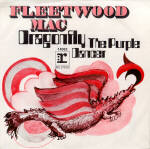
"Dragonfly" is a song written by British rock musician Danny Kirwan with lyrics taken from a poem by Welsh poet W. H. Davies. It was originally recorded by Kirwan's band Fleetwood Mac in 1970, and became the first UK single released by the band after the departure of their frontman Peter Green. It was also their first single with Christine McVie as a full member of the group. By the time the song had been released, guitarist Jeremy Spencer had left the band.
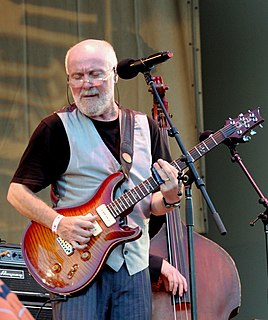
Jeremy Cedric Spencer is a British musician, best known as a guitarist in the original line-up of the rock band Fleetwood Mac. A member since Fleetwood Mac's inception in July 1967, he remained with the band until his abrupt departure in February 1971, when he joined the "Children of God", a new religious movement now known as "The Family International", with which he is still affiliated. After a pair of solo albums in the 1970s, he continued to tour as a musician, but did not release another album until 2006. He released further solo albums from 2012 onwards and has also recorded as part of the folk trio Steetley. As a member of Fleetwood Mac, he was inducted into the Rock and Roll Hall of Fame in 1998.
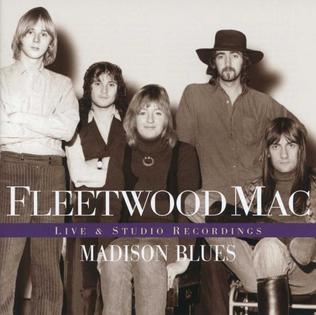
Madison Blues – Live & Studio Recordings is a compilation album by British blues rock band Fleetwood Mac, released in 2003. It is a compilation of BBC session tracks and live concert material from the band's first post-Peter Green line up, none of which had previously been officially released. It is unusual within Fleetwood Mac's catalogue as it focuses on the period between the successful Peter Green period and the start of the Bob Welch period which eventually led to another successful period for the band in the mid to late 1970s. Packaged as a double CD with a DVD interview with guitarist Jeremy Spencer, it came in a cardboard box with a foldout inner sheet.


















